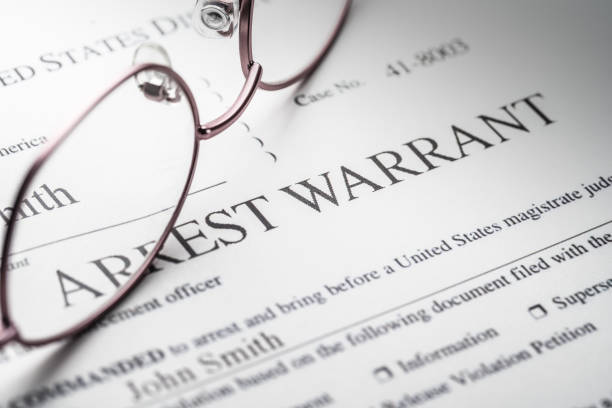the Wall, We Are Right
There With You
In California, warrants are legal orders issued by a judge, authorizing law enforcement to take specific actions such as arresting an individual or conducting a search. For anyone facing a warrant in California, especially in Los Angeles or Orange County, understanding the complexities can help mitigate legal repercussions. This article provides an in-depth examination of different types of California warrants, their legal nuances, and practical advice for handling them.
If you or a family member suspect that an arrest warrant may be outstanding, it is crucial to reach out to a criminal defense attorney at the earliest possible opportunity. Immediate legal assistance can make a significant difference in navigating through the complex legal system efficiently and effectively.

An arrest warrant is issued when there is probable cause to believe that an individual has committed a crime. Police officers, prosecutors, or grand juries request arrest warrants from judges by presenting evidence demonstrating a reasonable belief that a crime was committed and that the suspect was involved. Arrest warrants allow law enforcement to detain the person named in the warrant and bring them to court for criminal charges. Felony arrest warrants in California can be executed at any time, day or night, but misdemeanor warrants generally follow stricter guidelines and must be executed between 6 a.m. and 10 p.m. unless exceptions apply.
A bench warrant is typically issued when an individual fails to appear in court as ordered, neglects to pay fines, or violates other court directives. Unlike arrest warrants, bench warrants are not based on probable cause of criminal activity but rather on non-compliance with court orders. Once a bench warrant is issued, police can arrest the individual at any time, including during routine stops. If you’re facing a bench warrant, immediate legal action is necessary to resolve the issue and avoid further complications such as being detained.
Search warrants authorize law enforcement to search a specified location for evidence of a crime. In California, search warrants must meet stringent legal requirements under the Fourth Amendment to ensure that searches are not overly intrusive. Officers must present probable cause to a judge, specifying the place to be searched and the items to be seized. Additionally, search warrants must be supported by an affidavit from law enforcement and must be executed within 10 days from issuance.
These warrants are issued when individuals under probation or parole violate the conditions of their release. Such violations can range from failing drug tests to missing mandatory meetings with a probation officer. The consequences can be severe, leading to the revocation of parole or probation and the individual being taken into custody.
An alias warrant is issued when an individual fails to appear in court for a scheduled hearing after a citation, typically in traffic cases. This type of warrant is treated similarly to a bench warrant, and immediate legal action is needed to avoid arrest.
If you are facing a warrant, understanding your legal rights is crucial. Warrants remain active until the court recalls them, which means that they can be enforced at any time unless resolved. The first step in addressing a warrant is contacting the court or hiring a criminal defense attorney. For bench warrants, many courts allow individuals to schedule a new hearing or post bail, avoiding immediate arrest.
In cases involving arrest or search warrants, having legal representation is essential. A qualified attorney can challenge the validity of the warrant, especially if there were procedural violations such as the lack of probable cause or improper execution of the warrant. California law also offers protection against overbroad searches through the particularity requirement, ensuring that search warrants must be specific about the areas to be searched and the items to be seized.
For individuals facing criminal charges in California, a warrant can complicate the legal process. Once arrested on a warrant, the individual must appear before a judge within 48 hours. Failing to address a warrant promptly can lead to additional charges, higher bail amounts, or the revocation of any existing bail or probation agreements.
In cases where a warrant is improperly obtained, a defense attorney can file motions to suppress evidence or dismiss the charges. For example, search warrants that do not meet the particularity requirement or are issued without adequate probable cause may be challenged in court.
California’s legislative landscape has been evolving with new laws concerning digital privacy, especially with respect to search warrants involving electronic devices and online activity. Reverse keyword and geofence warrants are controversial techniques where law enforcement requests data from tech companies, such as Google, to identify individuals based on their search history or proximity to a crime scene. While such warrants can aid in complex investigations, they raise significant privacy concerns.
In response, California passed AB 793, which limits the use of reverse keyword and geofence warrants in certain contexts, particularly in cases involving reproductive health and gender-affirming care. This reflects California’s broader effort to protect digital privacy while balancing the needs of law enforcement.
Warrants are complex legal instruments that can have serious implications for anyone involved in a criminal investigation or court case in California. Whether you are dealing with a bench warrant, search warrant, or arrest warrant, it’s crucial to act quickly and seek legal counsel. Power Trial Lawyers, serving Los Angeles and Orange County, specializes in handling all types of California warrants. With expert guidance, you can navigate the legal system, challenge improper warrants, and protect your rights.
Contact Power Trial Lawyers today for a free consultation. Our experienced team of criminal defense attorneys will provide the advice and representation you need to resolve your warrant situation and achieve the best possible outcome in your case. Call now (888) 808-2179 or submit a contact form online to take the first step toward clearing your warrant and defending your future.